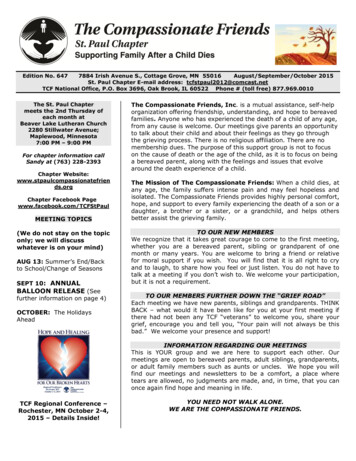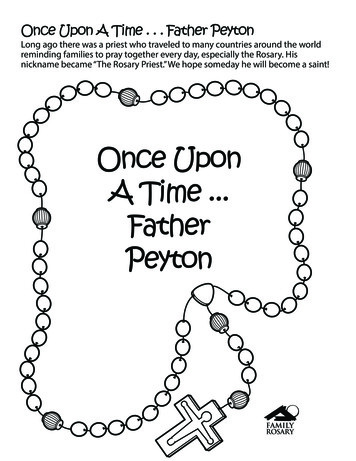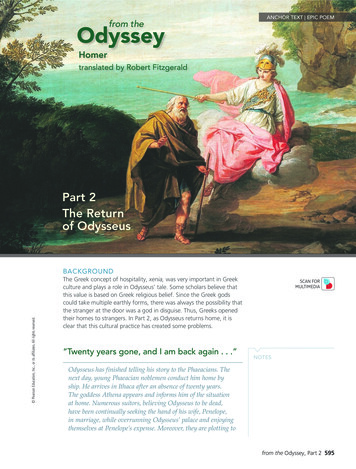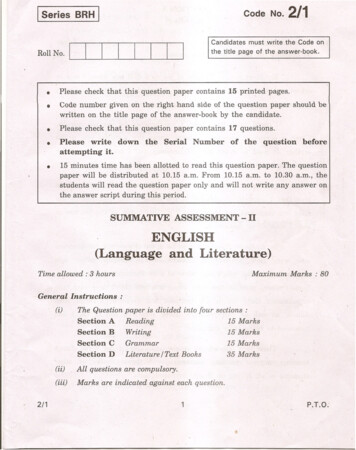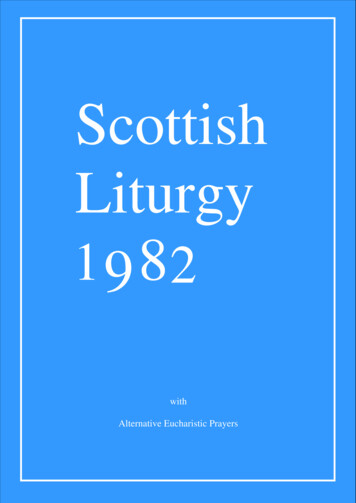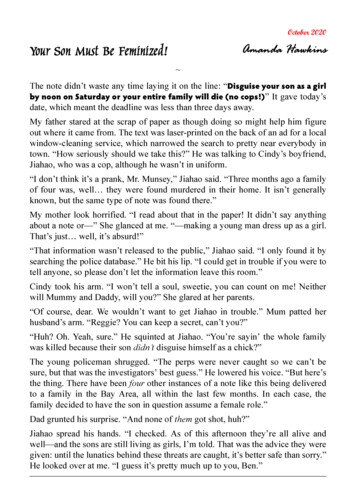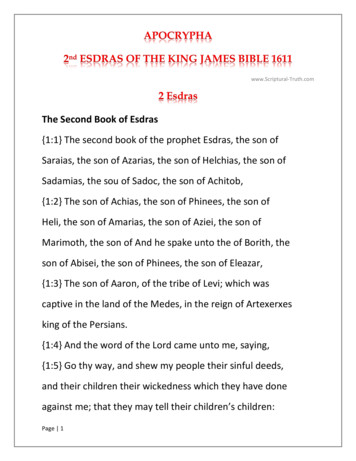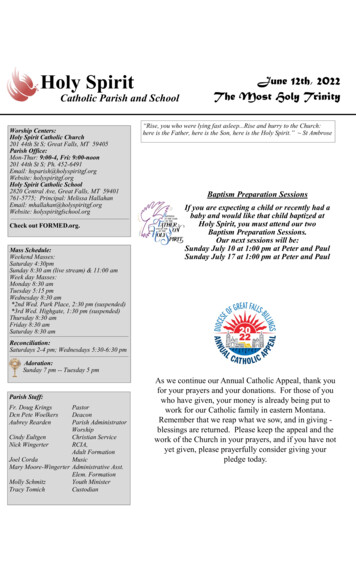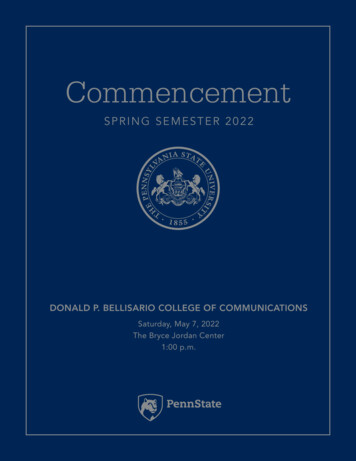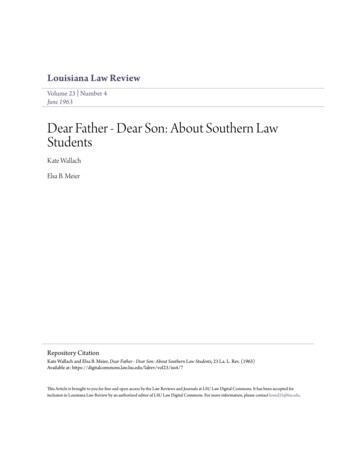
Transcription
Louisiana Law ReviewVolume 23 Number 4June 1963Dear Father - Dear Son: About Southern LawStudentsKate WallachElsa B. MeierRepository CitationKate Wallach and Elsa B. Meier, Dear Father - Dear Son: About Southern Law Students, 23 La. L. Rev. (1963)Available at: s4/7This Article is brought to you for free and open access by the Law Reviews and Journals at LSU Law Digital Commons. It has been accepted forinclusion in Louisiana Law Review by an authorized editor of LSU Law Digital Commons. For more information, please contact kreed25@lsu.edu.
DEAR FATHER - DEAR SONABOUT SOUTHERN LAW STUDENTS, 1840-1860Kate Wallactc* and Elsa B. Meier**Among the family papers of prominent Louisiana and Mississippi lawyer-planters, preserved in the Department ofArchives and Manuscripts, Louisiana State University, a numberof letters deal with the legal education of members and friendsof the families during the period 1840-1860. The letters revealthe father's desire to provide the best training for his son andthe son's appreciation for the educational opportunities offeredhim by his family; his impressions of the new life in a big citylike Boston or New Orleans; occasional longing for the countryside where he grew up; some homesickness and doubts as towhether the chosen course was the right one. A brief summaryon legal education in the United States before the Civil War ingeneral and in the South in particular precedes biographical introductions of the correspondents. It is believed that their letters are interesting historical documents and as such, in JusticeCardozo's words "in illuminating the past, illuminate the present, and in illuminating the present, illuminate the future.'".LEGAL EDUCATIONDuring the period before the Civil War, the members of thelegal profession were convinced that the only way to prepare forthe practice of law was by apprenticeship in the office of anexperienced attorney. The apprentice often had to pay a highprice for this "training." He assisted in copying legal documents, before the invention of the typewriter, ran errands, andunder direction, read legal textbooks, first English, later American. This practical program reflects the generally prevailingprejudice against formal schooling which the lawyers shared atthe time. They were "unconvinced, if not distrustful, of thebenefits that might flow to a lawyer through either a university or law school training."2Several attempts at adding law departments in the univerLibrarian and Associate Professor of Law, Louisiana State University.**Acquisitions Archivist, Louisiana State University.1. CARDOZo, THE NATURE OF THE JUDICIAL PROCESS 53 (1921).2. HARNo, LEGAL EDUCATION IN THE UNITED STATES 40 (1953).*Law[680]
DEAR FATHER-DEAR SON1963]sities were unsuccessful for quite some time. Thomas Jeffersonis credited with establishing the first law professorship at theCollege of William and Mary in 1779-1780. Ten years later,Judge James Wilson was appointed at the College of Philadelphia, James Kent at Columbia College in 1793, Chief JusticeParker at Harvard in 1815, Judge David Daggett at Yale in1825.3As early as 1756, William Smith, Jr. of New York had outlined a law curriculum which consisted of the following scienceswhich he deemed necessary for a lawyer to be familiar with:"18t -the English, Latin, and French Tongues. 2d - Writing,Arithmetick, Geometry, Surveying Merchants Accounts, orBookkeeping. 3d -Geography,Cronology, History. 4. Logickand Rhetorick. 5. Divinity. 6. Law of Nature and Nations orthe civil law. 7. Law of England." Among the suggested texts4is Domat's Civil Law.On February 21, 1821, in his address at the opening of theLaw Academy of Philadelphia, DuPonceau expressed the beliefthat "a national seminary of legal knowledge is absolutely wanted in this country; and cannot be much longer dispensed with."As the subjects to be taught he listed "the common law, the civillaw, the law commercial and maritime, the law of nature andnations, the constitutional and federal law of our country, andthe jurisprudence of the different States." He advocated a chairfor each of these subjects."Judge Story in his inaugural lecture of August 25, 1829, atHarvard, conceived his duties as Dane Professor of Law as follows: "to deliver lectures upon the Law of Nature, the Law ofNations, Maritime and Commercial Law, Equity Law, and, lastly, the Constitutional Law of the United States."6In 1835, Benjamin F. Butler devised a three-year study planfor the University of the City of New York which presentedquite a departure from the way in which courses were taught atother schools at that time. He proposed a Primary Course inOrganization and Jurisdiction of Courts, their modes of proceed3.REED, TRAINING FOR THE PUBLIC PROFESSION OF THE LAW4.107-59 (1921).HAMLIN, LEGAL EDUCATION IN COLONIAL NEW YORK 62, 197-200 (1939).5. Du Ponceau, Discourse on Legal Education in A DISSERTATION ON THE NA-TURE AND EXTENT OF THE JURISDICTION OF THE COURTS OF THE UNITED STATES173, 181-82 (1824).6.JOSEPH STORY: ACOLLECTION OF WRITINGS BY AND ABOUT ANAMERICAN JURIST 56-67 (Schwartz & Hogan, ed., 1959).EMINENT
LOUISIANA LAW REVIEW[Vol. XXIIIing in suits at Common Law, and in Equity, Admiralty andCriminal cases; and the System of Pleading generally, and ineach of the Superior Courts; a Junior Course in Law of the Domestic Relations, . . . Personal Property, including Commercialand Maritime Law, and a Senior Course in the Law of RealProperty, Corporations and Equity. A General or ParallelCourse was to be taught simultaneously to the whole school overthe three years, consisting of first-year courses in the Law ofNature and Nations; History of American Jurisprudence; Constitutional Law; Principles of Legislation; and Interpretation ofStatutes; second-year subjects suggested were Criminal Law;and Law of Evidence and for the third-year Selections from theRoman Law; Forensic Duties and Professional Ethics (pp. 1624). A period of clerkship was to be added to the courses. Butler wanted to combine practice with theory and develop the subjects in law school in the same fashion as they were introduced7to them during their apprenticeship training.During the period 1840-1860, however, none of the more ambitious plans for an expansion of the law school curriculum wasrealized. Even after the creation of law departments within anumber of universities, as distinguished from the creation ofsingle chairs, the program of formal education was limited andconsisted of lectures, drafting of legal instruments, arguing ofmoot cases, and prescribed readings.8Harvard during the 1840's had Story and Greenleaf, whocomplemented each other. The law students also enjoyed lecturesin other departments of the college, e.g., Sparks on Colonial History and Longfellow on Goethe.In 1837-1838 six Louisiana and two Mississippi law studentswere enrolled at Harvard in a class of 62 law students from f ifteen states; in 1844-1845 there were 156 students from 21 states;in 1859-1869, 166 students. 97. BUTLER, PLAN FOR THE ORGANIZATION OF A LAW FACULTY IN THE UNIVERSITY OF THE CITY OF NEW YORK (1835, republished 1956).8. General works which include history of legal education: AUMANN, THECHANGING AMERICAN SYSTEM 94-119 (1940); HOFFMAN, A COURSE OF LEGALSTUDY (2d ed. 1856) ; HURST, THE GROWTH OF AMERICAN LAW 256-60 (1950) ;WARREN, A HISTORY OF TILE AMERICAN BAR 164-87, 341-65 (1912).History ofindividual schools: A HISTORY OF THE SCHOOL OF LAW, COLUMBIA UNIVERSITY(1955) ; HARVARD CENTENNIAL HISTORY (1918) ; Brandeis, The Harvard LawSchool, 1 GREEN BAG 10 (1889) ; Daggett, The Yale Law School, 1 GREEN BAG239 (1889) ; Dwight, Columbia College Law School, New York, 1 GREEN BAG 141(1889) ; Patterson, The Law School of the University of Pennsylvania, 1 GREENBAG 99 (1889).9. 2 WARREN, HISTORY OF THE HARVARD LAW SCHOOL 34, 95, 217 (1908).
DEAR FATHER -DEAR1963]SONIn the 1850's Joel Parker, Emory Washburn, and TheophiliusParsons taught law at Harvard. Under Parson's direction thelaw faculty purchased a hotel, the Brattle House, which was toprovide inexpensive room and board for students with moremoderate means. Parsons figured that income from rent of 67bedrooms would bring 3,320.00 per year and that meals couldbe provided at 27 cents a day, or 1.89 per week and that 50men could obtain food and lodging for 2.50 a week.10At this time, less than half of the Harvard law students werecollege graduates. They entered or left at any period of the year,and were granted the LL.B. degree without examination after aresidence of eighteen months."According to Morison "the popular impression was that Harvard was reactionary, pro-slavery, and obstructing the 'Spiritof the Age.'"12Most of the southern students came from leading politicalfamilies of that region. There was a close affiliation between"the lords of the loom and the lords of the lash." Boston becamea pro-slavery community and it remained so, in social and business life, until 1861.13SOUTHERN LAW SCHOOLSIn Virginia, as Reed 14 observes, the apprenticeship systemwas not so firmly established as in the northern states. At William and Mary, Chancellor Wythe headed the School of Law andPolitics. His course was based on Blackstone, with lectures ongovernment and moot courts and moot legislatures for trainingin parliamentary law. International law was taught togetherwith moral philosophy in another department. In 1780, Williamand Mary had about 40 law students and in 1839 about 30 outof a total student body of 140.14Transylvania University (University of Kentucky)estab-10. Id. at 221.11. MORISON, THREE CENTURIES AT HARVARD 336 (1936).12. Id. at 287.13. 2 WARREN, HISTORY OF THE HARVARD LAW SCHOOL 157 (1908). Warrenasked former law students for an account of their experiences at the Harvard LawSchool. Edward A. Simon of St. Martinville, Louisiana, in his reply, characterized his teachers Greenleaf and Kent. He also mentioned the popularity whichLongfellow enjoyed with the law students. Warren notes that much of the portionof Evangeline relating to Louisiana was founded on a description of Simon's ownhome. Id. at 53-54, 107.14. REED, TRAINING FOR THE PUBLIC PROFESSION OF THE LAW 116-17 (1921).
LOUISIANA LAW REVIEW[Vol. XXIIIlished a law professorship at Lexington in 1799. Henry Claywas one of its early faculty members. This law school startedwith about 19 students. In 1821-1822 there were 49 law studentswhen Litchfield had only 26. In 1842-1843, with 75 students, itwas second to Harvard. 5The University of Virginia was opened in 1825. The chairfor law and politics was filled in 1826 with a practicing attorney. In 1851 an additional faculty member who specialized inConstitutional Law was appointed. At Virginia, InternationalLaw was offered by the law department. For many years, a lawstudent was encouraged, though not required, to register inmore than one school of the university.'At the University of Louisiana in New Orleans (Tulane University) a Law Department was organized in May 1847. JudgeBullard was appointed Dean and Professor of Civil Law. Hissuccessors in the deanship before the Civil War were RandellHunt (1850-1854), Christian Roselius (1854-1856), TheodoreHoward McCaleb (1856-1858) and, again, Randell Hunt (18581862). During the period of the Civil War the school was closed.The curriculum was taught by four faculty members, includingthe Dean, and covered Constitutional Law, Commercial Law,and Evidence; Civil Law; Common Law and Equity, Jurisprudence, and Admiralty and International Law. 17 A pamphlet published by the University of Louisiana in 1879 lists the numberof graduates in the law department with 16 in 1847-1848; 35 in1857-1858; and 31 in 1859-1860. The highest number of law students was 44 in 1851-1852.THE CORRESPONDENCE 1 8Henry A. Bullard to James G. TalicferroBullard's letter of July 22, 1842, to Judge Taliaferro waswritten before the organization of the Tulane Law Department.15. Id. at 118.16. Id. at 118-19.17. Harris, Editorial, 9 TUL. L. REV. 584 (1935) ; Brosman, The First Hundred Years, 22 TUL. L. REV. 543 (1943) ; Quintero, The Law School of the TulaneUniversity of Louisiana, 2 GREEN BAG 116 (1890) ; Franklin, The IntroductoryLecture of ChristianRoselius on November 13, 1854, 32 TUL. L. REV. 573 (1958).For a summary of some of the law lectures based on contemporary magazine reports, see Bonquois, The Career of Henry Adams Bullard, 23 LA. HIST. Q. 999,1055-63 (1940).18. The letters in this section were reproduced through the courtesy of Mr. V.L. Bedsole, Head, Department of Archives and Manuscripts, Louisiana State Uni-
1963]DEAR FATHER -DEARSONAs is well known, both correspondents served as Justices of theLouisiana Supreme Court; both had received their legal education outside of Louisiana.Henry Adams Bullard was born in Pepperell, Massachusetts,on September 9, 1788. His father was a Congregational clergyman who sent the fourth of his eight children to Harvard College where Bullard graduated in 1807 at the age of nineteen. Hethen read law in the offices of Luther Lawrence in Groton, Massachusetts, and Peter A. Browne in Philadelphia. He was admitted to the bar about 1812. He possessed a reading and speaking knowledge of French, Spanish, Italian, and German.Bullard came to Natchitoches, Louisiana, by way of Texaswhere he had participated in the Texas movement for independence as aide-de-camp and secretary to General Toledo. He beganthe practice of law in 1813. He married Sarah Maria Kaiserin 1816. The couple had two sons and three daughters. Theirproperties included a summer home on the Red River and aplantation near Opelousas. From 1819-1821, Bullard served asa district court judge. He was elected to the Louisiana Legislature in 1820. For a while he moved to Alexandria, where hebecame President of the Board of Trustees (mayor). From1826-1830 he resumed the district judgeship. From 1830-1834,he represented the National Republican Party in the Congressin Washington and supported Henry Clay. In 1833, he resignedhis seat in order to accept appointment as an associate Justiceof the Louisiana Supreme Court. Except for the period February 5, 1839, to December 17, 1839, when he was Secretary ofState, he remained on the Supreme Court until 1846, when newJustices were elected under the 1845 Constitution. In 1836,Justice Bullard became the first president of the LouisianaHistorical Society.When he left the Court on March 18, 1846, although in illhealth, he resumed the practice of law in New Orleans. In 1847,he was appointed Dean and Professor of Civil Law at the University of Louisiana. When he was again elected to Congress inSeptember 1850, he resigned the deanship. He died in New Orleans on April 17, 1851.19versity, Mrs. Meier searched for and assisted in the selection of the letters andin the preparation of biographical information. No attempt was made to providecomplete coverage in this article. The sources consulted were, with one exception,those readily available on the Baton Rouge campus.19. Bonquois, The Career of Henry Adams Bullard, 23 LA. HIST. Q. 999, 1055-
LOUISIANA LAW REVIEW[Vol. XXIIIJames G. Taliaferro was born in Amherst County, Virginia,in 1798. He was of Italian descent. He received his educationat Transylvania University, Kentucky. He moved to Louisianawith his father in 1814 and settled in the Ouachita country. Hewas a member of the Louisiana Constitutional Conventions of1852 and 1868 and also of the 1861 Secession Convention.Quintero reports that he "was devoted to the Constitutionand the union of the States, he calmly, steadily and fearlesslyopposed secession .And when at last the ordinanceofsecession was adopted by an almost unanimous vote, he drew uphis protest against the act, and asked to have it spread uponthe journal of the convention. This was denied him." Quinteroquotes Taliaferro on this occasion "My conscience is my guide;my judgment and patriotism approve, and though I am scornedand hissed, I am willing to abide the arbitrament of time andevents as to the correctness of my course." 2Taliaferro became a parish judge in 1840. He served as aJustice of the Louisiana Supreme Court from July 1, 1866, toNovember 3, 1876, the date of his death at the age of seventy21eight years.Quintero describes him as a "first rate scholar in the classics,science, and history." A contemporary "tourist" (J. W. Dorr)acknowledges information received from the judge while visiting Catahoula Parish: "[T]o the courtesy of Judge Taliaferro,a learned gentleman who has the tastes and has pursued thestudies of an antiquarian savant, I hold myself much indebtedfor the privilege of inspecting his collection of curious remainsof Indian ingenuity and for varied information as to the geological characteristics of the parish." Dorr also reports that"the only newspaper in the parish is The Independent, a soundand ably conducted journal of large circulation, published atHarrisonbourg, James G. Taliaferro editor and proprietor, and' 22J. Q. A. Taliaferro, publisher.63 (1940);White, in 3 DICTIONARY OF AMERICAN BIOGRAPHY 254UNITED STATES CONGRESS, BIOGRAPHICAL DIRECTORY (1961).20. Quintero, The Supreme Court of Louisiana, 3 GREEN BAG 113, 120(1929);(1891).21. Dart, The Celebration of the Centenary of the Supreme Court of Louisiana,133 La. xxv, xxxv-vi (1913), 4 LA. HIST. Q. 5, 113-16 (1921).22. A Tourist's Description of Louisiana in 1860, 21 LA. HIST. Q. 1110, 1204,1207 (Prichard, ed., 1938). Dorr was a reporter for the Crescent, whose factualdata collected during visits to a number of parishes were published under the title"Louisiana in Slices" from April 30-September 10, 1860, in the Crescent, NewOrleans.
1963]DEAR FATHER -DEARSONThe Judge's son, Henry Bullard Taliaferro, graduated fromthe Law Department of the University of Louisiana in 18661867. His daughter's son, Taliaferro Alexander, was born in1846 and practiced law in Shreveport until his death in 1924.The judge's great grandson, Albert L. Alexander, graduatedfrom the Law Department of the University of Virginia in 1907and, like his father, assumed the practice of law in Shreveport.Extract of a letter fromH. A. BULLARD TO JUDGE JAMES G. TALIAFERRO[address: Harrisonburg, Catahoula, La.]N. Orleans, July 22, 1842My dear Judge,I have thought upon the subject of your Son and of the best coursefor him to pursue. I would not think it advisable for him to come to thecity in the first instance. He would do well to read a pretty extensive coursefirst, beginning with the law of nations or perhaps Kent's commentarieswhich gives the best outline of a system of studies. I would recommendMr. Stacey of Concordia if he would take him into his office. After yourson is pretty well read in the first elements of the profession, he would dowell to pass two or three months every season in N. Orleans, where theCourts are always in blast and where he would see the application of principles-Thus you see I would combine the theory with the practice-Butit would be still better if you could send him for a term or two to the LawSchool at Cambridge at the head of which is Judge Story -Wehave nowseveral of the alumni of that School who are gaining rapidly in their profession - Such as Judge Campbell, my nephew at Clinton, young Dalton andmany in the City.Thomas Benjamin Gaillard to Mrs. S. A. C. FosterIsaac Gaillard, the father of Thomas Benjamin Gaillard andMrs. S. A. C. Foster, was an early settler of Adams County,Mississippi. His name appears in Andrew Ellicott's Journal onseveral occasions among the leading citizens of the community. 23His son's letter from Cambridge, Massachusetts, was foundin the Foster papers.2 4 Thomas Benjamin Gaillard graduatedfrom Oakland College, Mississippi, in April 1843. He attendedHarvard Law School in 1843 and 1844 and considered himselfentitled to his diploma in 1845 although he did not receive ituntil 1846. At the time when he furnished this information tohis alma mater, March 20, 1889, he was living in Cedar Bayou,23. Ellicott was United States Commissioner for determining the boundary between the United States and Spain. His Journal was first published in Philadelphia in 1803, and republished by Quadrangle Books. See ELLICOTT, JOURNAL 117,158, 162-63 (repub. ed. 1962).24. Mrs. Foster's husband was a physician. The Foster House in Natchez isdescribed as having been built in the Spanish era (1779-1798) in FEDERALWRITERS' PROJECT, Mississippi 335 (1938).
LOUISIANA LAW REVIEW[Vol. XXIIIHarris County, Texas. It is presumed that he died in NewOrleans in 1889.25Extract of a letter fromT. B. GAILLARD TO MRS. S. A. C. FOSTERCambridge, Sept. 26th 1843My. dear Sister. . . Sister- when I first arrived at this place the Blues almost distracted me- but if you could see my rooms-my boarding-house, the professors and all that concerns me in this place you could not blame me fornot only being contented but desirous of remaining here the two years youspoke of. A word in private though I will come home in eighteen monthswith a diploma from that excellent old man Judge Story if nothing to coolme happens. The manner in which Judge Story treats a stranger is becomingto him and would do honor to anyone possessing the heart of a noble being.My landlady in the first place put me in a room which at that time lookedpreferable to this but with with [sic] the assistance of forty dollars cashedup in advance she has made this superior to the other. Imagine a room aboutas large as your bed-room -ceilinglower for comfort in winter-a carpetmade since I paid the forty dollars- though equal to any parlor-carpet inthe Southa dresser exactly like mine at home except that the mirror has agilt frame-a secretary something favoring mine at Etania-with moreknobs & drawers, extras etc.-a center table covered with damask - flowersblue with yellow filling- a sofa span new-about six feet long mahoganycovered with hair-cloth in the seat and back -alarge rocking chair spannew - an armchair stuffed and covered with hair-cloth - a small mahoganyside table for hats etc. and six chairs like your parlor-chairs - an astrallamp - two extra Brittania side lamps - a mahogany book frame span newfire apparatus too tedious to mention - damask window curtains - and youwill have my parlor in your mind's eye. My bed-room adjoins the parlor, goodbed - good washstand etc. My boarding is the best in Cambridge - and eightfine-hearted Yankee fellow students make the meal hours more agreeable .The Law students are respected as much as the professors of College - infact they meet with more attention from the citizens. Undergraduates are notadmitted into their society generally - but we generous Southerners considerSouthern undergraduates of Junior & Senior classes not beneath us You wouldbe amused to bear my old negro talk He says - "Well Massa you dont getup before six o'clock Law students don't, sir and they are the most prosperestgentlemen here in this place" It surprised me I assure you to have a merchantask me if I belonged to the law school and hearing that I did - consent tocredit me which of course I refused - preferring to pay cash always .I have seen two funerals since I arrived at Cambridge, one of them wasthe funeral of one of the old Professors - The Unitarian service for the deadis singular enough - It was performed by the Faculty in general each onetaking a particular part The organist of the College chapel made music veryappropriate to the occasion - the service seemed to impress all .Joseph Bardwell Lyman and George Daniel Farrarto Alexander K. FarrarFifteen years later, in 1858, another son of a Natchez arearesident reported to his family from Cambridge, George D.Farrar. His father, Alexander K. Farrar, was an influential25. Photostatic copies of letters and clippings supplied by Mr. George A.Strait, Assistant Librarian, Harvard Law School Library.
19631DEAR FATHER -DEARSONlawyer-planter in Kingston, Adams County, near Natchez, Mississippi. Alexander K. Farrar served as a state senator from1852-1858. He is more frequently referred to in the group ofthe "great cotton planters of the state" than among the great26lawyers of the period.His nephew, Daniel S. Farrar, in an article describing hisuncle's deed of land to the Kingston Church, executed in 1874,gives some family background information. 27 Alexander's parents were Daniel Farrar and Eliza King Farrar. His motherwas the daughter of Caleb King who laid out the town ofKingston. Caleb King was married to Mary Swayze, daughterof Richard Swayze. Thus the Farrars are descendants of theearliest settlers of the Natchez region who obtained a grantfrom King George III of England in 1768.28Alexander Farrar lost most of his fortune in the Civil War.He was such a heavy man weighing more than three hundredpounds, that he had a special pew constructed for his own usein the church in Kingston.The son, George Daniel, was a student at Yale in i855, atthe University of Virginia from 1855-1858. He attended theHarvard Law School in 1858-1859. He is listed in Booth as aconfederate officer who served in the Louisiana Heavy Artillery.2It is believed that he married inwife after the Civil War when hemained in Cambridge. From a notefrom Commencement Plantation itturned to Mississippi.Cambridge and divorced hisreturned South and she rewritten by him to his fathercan be assumed that he re-The Farrar Papers contain reports on absences from theUniversity of Virginia on Mr. George D. Farrar. The first report as of November 1, 1856, is a perfect attendance record.March 2, 1857, is different. The son explained in one of hisletters to his father that he did not like Virginia, but he 8(1938);Woods, Mississippi Secession Convention, 6 Miss. HIST. Soc. PUB. 95 (c. 1902)Wooster, The Membership of the Mississippi Convention of 1861, 16 J. Miss.HIST. 242 (1954).27. Farrar, Alexander K. Farrar'sDeed to Kingston Church, 1874, 17 J. Miss.HIST. 135 (1955).28. Drake, A Note on the Jersey Settlers of Adams County, 15 J. Miss. HIST.274 (1953).29. 2 BOOTWI, RECORDS OF LOUISIANA CONFEDERATE SOLDIERS 812 (1920).
LOUISIANA LAW REVIEW[Vol. XXIIIpressed his appreciation for the education afforded him by hisfamily. In January 1858, he showed no improvement in modernlanguages, omitted the exercises, and was absent seven times;however, he did not miss History or Literature.That the father worried about his son at Virginia can beassumed from letters written to the father by Joseph BardwellLyman in 1856-1858 from New Orleans. Joseph Lyman wasborn on October 6, 1829 in Chester, Massachusetts. His Englishancestors emigrated to New England. in 1631. He graduatedfrom Yale in 1850, then taught school in Connecticut and inMississippi. In June 1853, he went to Nashville, Tennesseewhere, until he moved to New Orleans early in 1855, he studiedlaw and again taught school. In 1856, he graduated from theLaw Department of the University of Louisiana and for thenext five years practiced law in New Orleans. At the outbreakof the Civil War he enlisted as a private in the first LouisianaCavalry. He was taken prisoner. After his release he gave upthe practice of law, moved North and became an accomplishedagricultural editor in New York, where he died of smallpox onJanuary 28, 1872.80Extracts of letters fromJOSEPHB. LYMAN TO ALEXANDER K. FARRARL. C. & G. B. DUNCAN'S OFFICENorth West Corner of Exchange Place and Custom House Street, Up StairsLucius Campbell Duncan.Greer Brown Duncan.New Orleans, January 21st, 1856Hon. A. K. FarrarJackson, Miss.My Dear Friend:I cannot be mistaken in supposing that You will feel Some interest inreading a few lines from me, . . . I am quite satisfied of the wisdom ofmy course in coming to New Orleans this winter. I do not read as manyhours as I would have done at Vidalia and my Expenses are larger but hereI am in the fullest sense in medias res. Commerce with all its roar andbustle, with its complications and incidents, with its thousand drays andthousand Wheels, its thousand storehouses and its ten thousand buisy [sic]devotees is all around me and constantly before me. Then I am constantlythrown in contact and hold intercourse with able and accomplished men andyour own experiense [sic] will suggest to you how important and invaluablea source of mental growth and Strength is thus afforded to an observing andthoughtful spirit.In the Law School itself I am not disappointed. The lectures read to usthe questions put to us -thecases argued by us in the Moot Court have asimmediate and direct a tendency to make good lawyers of those of us whowill improve them as any course to training that could be invented.Roselius is by some odds our best lecturer. He is undoubtedly the mostlearned and able man at this Bar. Soul and Hunt are better Speakers30. Gabriel, in 11 DICTIONARY OF AMERICANBIOGRAPHY 516(1933).
1963]DEAR FATHER -DEARSON691his superior inand Benjamin is a more wary and dextrous pleader -perhapsfor general Solid legal judgement [sic] & EruditionCommercial Law -butRoselius stands 1st. Randall Hunt is very much of a mail tho'. No memberof this Bar has more Elegant learning and none a more forcible and captivating delivery. But Mr. Hunt dresses very well. His pocket handkerchiefis always spotless and the bows of his silk necktie are of uniform length andsymmetry. He talks well and Swears a pretty oath. The ladies like him,and it suits him to sit long at dinner and sip fine liquors & say good things.But when fairly harnessed into a big case Hunt pulls Strong like a Wheelhorse 18 hands high.In the Law School we have a lecture every evening at 5 o.cl. and duringthe day we read on the subject of the lecture at evening. For Example,today I am reading Commercial Law for Hunts Lecture this Evening is onAffreightment & the liabilities of Common Carriers. Tomorrow I read Constitutional Law for M'Caleb in the evening.I am in the office of Mr. Duncan. .
DEAR FATHER-DEAR SON sities were unsuccessful for quite some time. Thomas Jefferson is credited with establishing the first law professorship at the College of William and Mary in 1779-1780. Ten years later, Judge James Wilson was appointed at the College of Philadel- phia, James Kent at Columbia College in 1793, Chief Justice .


